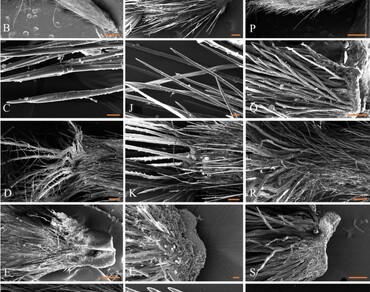Achene morphology of Catamixis baccharoides, Ainsliaea aptera and Leucomeris spectabilis
*Article not assigned to an issue yet
Bhattacharyya Subhasmit, Singh Harminder, Kumar Puneet, Deroliya Purushottam Kumar, Singh Sushil Kumar
Short Communications | Published: 30 May, 2025
First Page: 0
Last Page: 0
Views: 1352
Keywords: Achene, Asteraceae, SEM, Endangered, Western Himalayas
Abstract
The genus Catamixis Thomson, belongs to the Asteraceae family and includes only one species, Catamixis baccharoides Thomson. This name reflects its unique combination of morphological traits that resemble other genera, complicating its classification within the familial framework. C. baccharoides is a chasmophytic shrub endemic to the Himalayan region, with its distribution spanning from western Nepal to the Indian states of Uttarakhand, Haryana and Himachal Pradesh. The current study seeks to meticulously investigate and analyze the micro-morphological characteristics of the achene through Scanning Electron Microscopy (SEM) of the endangered C. baccharoides. Based on SEM studies on the achene, this species is further distinguished from two related species, Ainsliaea aptera DC. and Leucomeris spectabilis D.Don..

References
Bean AR (2001) Pappus morphology and terminology in Australian and New Zealand thistles (Asteraceae, tribe Cardueae). Austrobaileya 6(1):139–152. https://doi.org/10.5962/p.299660
Bona M (2015) Systematic implications of achene characteristics in genera Centaurea L., Canus Mill., Psephellus Cass. and Rhaponticoides Vaill. (Asteraceae). Bangladesh J Pl Taxon 22(2):125–136. https://doi.org/10.3329/bjpt.v22i2.26074
Bremer K (1994) Asteraceae: Cladistics and Classification. Timber Press, Portland, Oregon
Dhiman R, Thakur A, Yadav S, Verma PK (2022) Status of Catamixis baccharoides Thomson (a critically endangered plant) in Western Himalayas. J Environ Biol 43(6):826–833. https://doi.org/10.22438/jeb/43/6/mrn-4035
Feng ZH, Huang ZJ, Sun HN, Liu S (2024) Meeting necessity instead of serendipity: Miscellaneous nomenclatural notes on Asteraceae. Phytotaxa 644:124–134. https://doi.org/10.11646/phytotaxa.644.2.4
Fu ZX, Jiao BH, Nie B, Zhang GJ, Gao TG (2016) A comprehensive generic-level phylogeny of the sunflower family: Implications for the systematics of Chinese Asteraceae. J Syst Evol 54:416–437. https://doi.org/10.1111/jse.12216
Gabr DGI (2019) Significance important of fruit character for some Asteraceae species in identification and differentiation level. Haya: Saudi J Life Sci 4:262–270. https://doi.org/10.36348/sjls.2019.v04i08.003
Hajra PK (1984) Catamixis baccaroides Thoms (Asteraceae). In: Jain SK, Sastry ARK (eds) The Indian plant red data book, vol 1. Botanical Survey of India, Howrah, pp 38–39
Hansen HV (1991) Phylogenetic studies in Compositae tribe Mutisieae. Opera Bot 109:1–50
Jeffrey C (2007) Introduction with key to tribes. In: Kadereit JW, Jeffrey C (eds) The families and genera of vascular plants 8 (Flowering Plants: Eudicots. Asterales.). Springer, Berlin, pp 61–87
Karaismailoglu MC (2015) Morphological and anatomical features of cypsela of some Crepis taxa (Asteraceae) from Turkey and their taxonomic importance. Pak J Bot 47:1473–1480
Kreitschitz A, Vallès J (2007) Achene morphology and slime structure in some taxa of Artemisia L. and Neopallasia L. (Asteraceae). Flora 202:570–580. https://doi.org/10.1016/j.flora.2006.12.003
Mandel JR, Dikow RB, Siniscalchi CM, Thapa R, Watson LE, Funk VA (2019) A fully resolved backbone phylogeny reveals numerous dispersals and explosive diversifications throughout the history of Asteraceae. Proc Natl Acad Sci 116:14083–14088. https://doi.org/10.1073/pnas.1903871116
Nayar MP, Ahmedullah M (1985) Catamixis baccharoides Thoms.—An endemic chasmophyte of the W. Himalaya under threat. Bull Bot Surv India 27:248–250. https://doi.org/10.20324/nelumbo/v27/1985/74802
Ortiz S, Bonifacino JM, Crisci JV, Funk VA, Hansen HV, Hind DJN, Katinas L, Roque N, Sancho G, Susanna A, Tellería MC (2009) The basal grade of the Compositae: Mutisieae (sensu Cabrera) and Carduoideae. In: Funk VA, Susanna A, Stuessy TF, Bayer RJ (eds) Systematics Evolution and Biogeography of Compositae. IAPT, Vienna, pp 193–213
Ozcan M, Akinci N (2019) Micromorpho-anatomical fruit characteristics and pappus features of representative Cardueae (Asteraceae) taxa: their systematic significance. Flora 256:16–35. https://doi.org/10.1016/j.flora.2019.04.009
Panero JL (2008) Shared molecular signatures support the inclusion of Catamixis in subfamily Pertyoideae (Asteraceae). Phytologia 90:418–424
Panero JL, Funk VA (2002) Toward a phylogenetic subfamilial classification for the Compositae (Asteraceae). Proc Biol Soc Wash 115:909–922
Panero JL, Funk VA (2007) New infrafamilial taxa in Asteraceae. Phytologia 3:356–360
Panero JL, Funk VA (2008) The value of sampling anomalous taxa in phylogenetic studies: Major clades of the Asteraceae revealed. Mol Phylogenet Evol 47:757–782. https://doi.org/10.1016/j.ympev.2008.02.011
Panwar GS, Joshi B, Srivastava A, Ambrish K (2018) In vitro rescue and habitat restoration of critically endangered and endemic Catamixis baccharoids Thomson: a monotypic genus. Proc Int Biodiv Congr (IBC 2018) 4:1–6
POWO (2024) Plants of the World Online. Royal Botanical Garden, Kew, London, U.K. https://powo.science.kew.org/. Accessed 30 Aug 2024.
Pundir YPS (2015) Is Catamixis baccharoides Thoms. Endangered or at the verge of Extinction? Distribution and an approach for Conservation. Kobo–ebook. https://store.kobobooks.com. Accessed 30 Aug 2024.
Pusalkar PK, Srivastava SK (2015) Lectotypification and new locality report for monotypic and critically endangered genus Catamixis (Asteraceae: Pertyoideae: Pertyeae). Nelumbo 57:11–18. https://doi.org/10.20324/nelumbo/v57/2015/87083
Rewicz A, Marciniuk J, Marciniuk P (2020) Achene micromorphology and its taxonomic significance in some species in Taraxacum sect. Palustria (Asteraceae). PhytoKeys 166:1–28. https://doi.org/10.3897/phytokeys.166.54271
Srivastava A, Debta MR, Srivastava SK, Dangwal LR (2016) Catamixis baccharoides Thomson (Asteraceae), a new record for Himachal Pradesh. Indian J For 39:363–366. https://doi.org/10.54207/bsmps1000-2016-npq2qp
Srivastava A, Srivastava SK, Dangwal LR (2017) Specific habitat requirement and ex-situ conservation of some threatened plant species of Western Himalaya. NeBIO 7(4):179–184
Srivastava A, Srivastava SK, Dangwal LR (2021) Ex-situ conservation of threatened plants of India at Botanical Survey of India, Dehradun. In: Roy RK, Khuraijam JS (eds) Indian botanical gardens. Daya Publishing House, New Delhi, pp 85–92
Thomson T (1867) On two new genera of Compositae Mutisiaceae, from India. Bot J Linn Soc London 9(38):342–343. https://doi.org/10.1111/j.1095-8339.1866.tb01297.x
Author Information
Botanical Survey of India, Northern Regional Centre, Dehradun, India